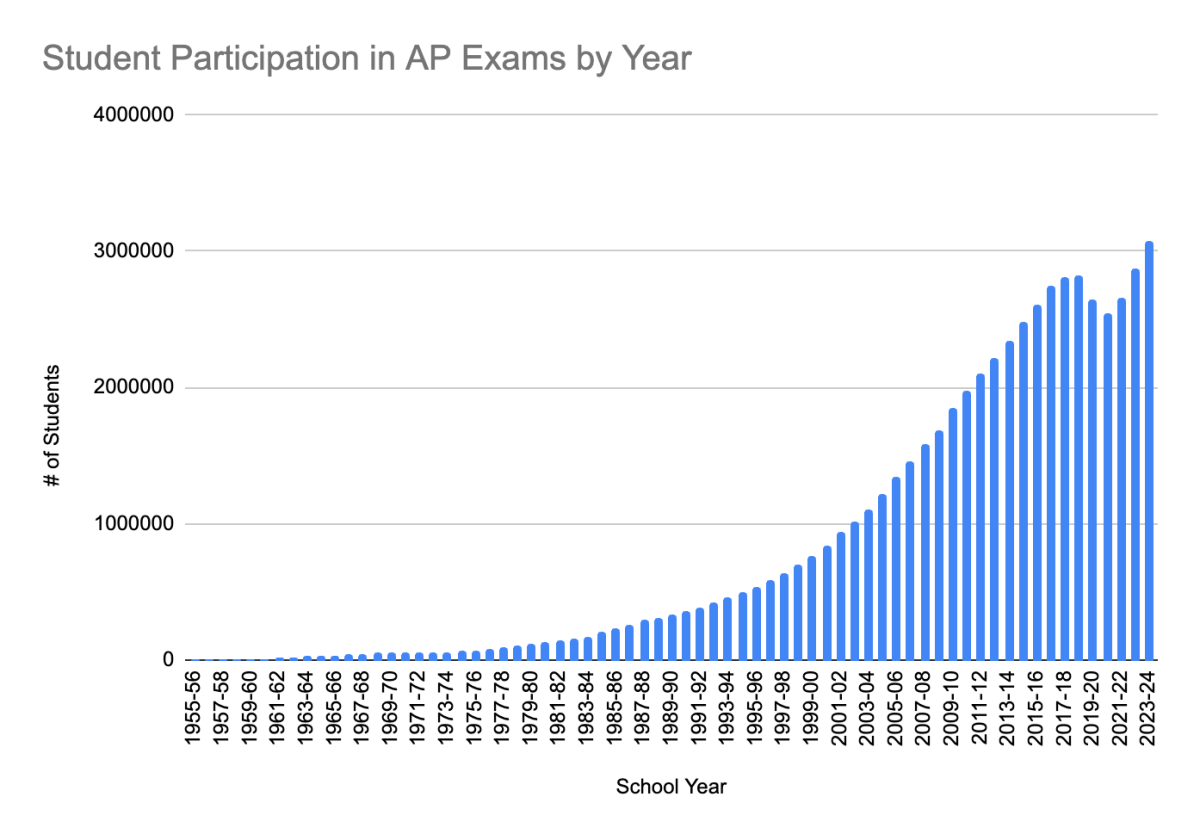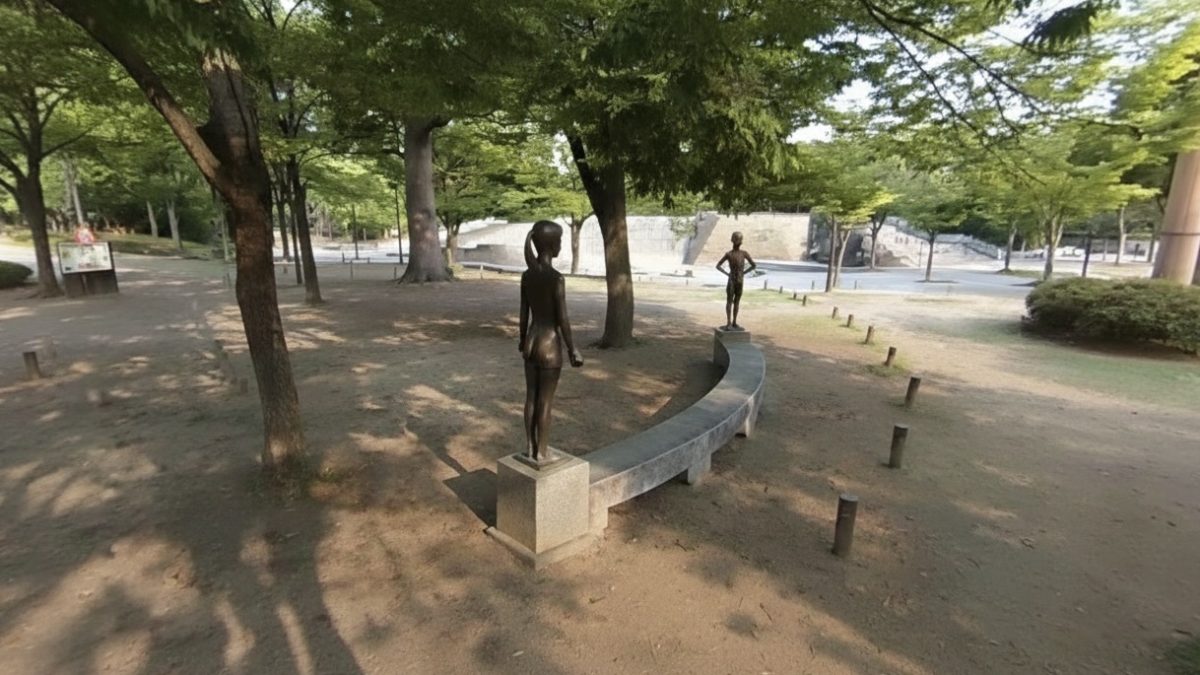The AP courses that once were the spark to a student’s college application are beginning to lose their shine. In fact, more and more prestigious private schools have decided to remove AP courses altogether.
AP courses, also known as Advanced Placement, are a program of college-level classes developed by the College Board. When AP curricula were first introduced in 1952, they served as the differentiator that allowed college counselors to recognize student rigor and distinguish students from one another in the college application process. Due to this notion and the misconception of taking 8 to 12 APs to become a ‘competitive’ applicant for the Ivy Leagues, students felt the need to load up their applications with these courses to show their academic rigor, passion, and suitability for college-level learning. In 2023, student participation in AP courses reached the highest level ever, with approximately 2.9 million students taking more than 5 million exams.
As the number of AP test-takers increased year by year, Bob Whelan, head of Greens Farms Academy (GFA), explained that AP courses have “ceased to serve as the differentiator for students the way it once did.”
A graduate of Brown and Stanford, counselor of the Brown Alumni Program (ACAP), and former member of the admission committees at Georgetown, Dartmouth, Carleton, and Dickenson, Rebecca Bliss shared in a panel interview with Whelan that students who “have the opportunity to dig into an area of interest beyond the cursory of what is needed to cover for a test” and share those opportunities with colleges in their applications “become far more compelling applicants.” Bliss continues to emphasize that with the way admissions are going these days, the ability for students to “tell the story of their intellectual journey” beyond AP courses and exam-based studies is becoming a more important factor in applications.

Why APs fall short of real, in-depth learning
Many students take AP courses in hopes of exploring their interests in a certain field at greater depth. However, as a curriculum that is tightly restricted due to the exams, AP curricula fail to live up to the expectations of “in-depth” learning. In fact, Bliss characterizes AP as a curriculum that forces a teacher to ‘sprint’ from A to Z in a certain amount of time, limiting innovation, development of interests, and in-depth learning.
Multiple teachers around the United States raised the same concerns. “Students didn’t have enough time to digest the [material], and at the end of the year, students just worked on test prep instead of learning anything new from the class,” said Bin He, an AP Chinese Language and Culture teacher. Often, when teaching an AP course, teachers feel pressured to rush through the curriculum to leave time for exam preparation. This creates a repetitive cycle of learning and teaching solely for the purpose of an exam. Patty Carver, a veteran teacher at Holton-Arms School in Bethesda—a school that has dropped AP courses—expresses similar concerns as she characterizes AP curricula as “too much emphasis on test preparation.”
While the content of AP courses might be at a first-year college level, it tends to be very focused on memorization and test-taking skills, which is not what the students who wanted to go more in-depth in learning hoped to gain from these courses.
Shifting priorities in education: the movement beyond APs
In response to the decreasing importance of APs in the college application process, the unnecessary stress induced by memorization skills that don’t really impact a student’s success in college, and the limited innovation and in-depth level in an AP class, multiple elite high schools across the US have decided to move beyond APs, replacing AP curricula with other courses such as Honors programs. In fact, as of November 2024, in the state of New York, “50% of independent schools have either considered making the switch [away from APs] or are in the process of—or have already completed—it.”
Harvard-Westlake School is one of many high schools in the US that have decided to cancel AP courses. “Starting next school year, the administration will remove all Advanced Placement (AP) classes,” the Head of Upper School, Beth Slattery, stated in November 2024. After months of weighing the benefits and drawbacks of the decision, Slattery decided that the “extra stress” for students caused by the rushed teaching of the curriculum to make time for test preparation is not worth it. “APs really constricted innovation in the classroom,” Slattery said.
Similar concerns were raised by the faculty at Greens Farms Academy (GFA), a private institute in Westport, CT. Teachers pointed out that due to the AP courses’ prioritization of “breadth over depth,” they crowd out “in-depth inquiry, thoughtful discussion, and student-centered teaching,” and “[do] not call forth the best work that many of the students are capable of.” In addition, due to the tight restrictions on the AP curriculum, teachers at GFA face the inability to address the interests of students that range outside of the AP curriculum. “AP courses can limit great teachers’ ability to unlock their students’ intrinsic motivation,” Whelan said. Motivated by these concerns, Whelan announced: “We will be phasing out APs at the GFA so that we can (…) better prepare our students for college and beyond, and so that we can pave the way for more students to do more ambitious, more meaningful work, and at a higher level than our current AP latent curriculum allows.”
Beyond APs: Mixed Reactions
Over the past two decades, the prominent role of APs in high school and the overrated value of AP courses implied by counselors have caused students and parents to develop an intense attachment to these courses. This promoted the belief that without an adequate number of AP courses, the students will have no chance at universities in the US. However, it is crucial to turn our eyes to the benefits of a non-AP curriculum.
Sara Harberson, the founder of Application Nation, an organization that provides personalized advice for college applicants, said that through her past experiences as the director of college counseling at a private high school that has a non-AP curriculum, she believes that “parents should keep an open mind to the cancellation of APs” as it can “dramatically improve students’ learning and decrease stress.” Specifically, she points out that the elimination of APs brought liveliness to classes, adding “depth” and “engaging discussions” to lessons that were once designed to “teach to a test.”
Other schools dropping APs in the US, such as Sidwell Friends, Georgetown Day, National Cathedral, shared similar feedbacks in an interview with The Washington Post: “Collectively, we believe a curriculum oriented toward collaborative experiential and interdisciplinary learning will not only better prepare our students for college and their professional futures, but (…) will [also] appeal to students’ innate curiosity, increas[ing] their motivation and fuel their love of learning,” something AP curricula lack due to the heavy emphasis on exam preparation.
Still, despite the schools’ attempt to promote the benefits of moving beyond APs, high schools received mixed feedback from students regarding the cancellation of APs. While some students acknowledge the long-term benefits of removing APs, many students see it as an “unnecessary obstacle.”
This can be reflected in the high school student body of the Harvard-Westlake School. On one hand, Rowan Callaghan, a senior (‘25) from Harvard-Westlake School, views the removal of AP courses as a good thing in the long term. Abby Landres, on the other hand, holds a different opinion from her peer. Landres explains that the removal “makes it harder to show [her] skills in certain categories” for college applications.
In addition, this is a significant setback for students who wish to apply for universities abroad, as “AP tests are all you can rely on to show your academic achievements,” Landres says.
Take the UK as an example. “The UK admissions process is very academic, … as they put a large emphasis on the student’s academic achievements,” college counselor Nevana Skobic, an experienced UK admissions strategist, said. While applicants can choose only to submit national curriculum grades, “not all UK universities may necessarily accept each and every country’s national curriculum.” Therefore, unless the university personally recognizes the validity of the specific school’s curriculum, “it is essential to take APs or other equivalent and internationally recognised curricula.”
To many ambitious high schoolers, like Landres, the improvement in the liveliness of classes and the ability to explore beyond the limits of the AP curriculum were not enough to suppress the stress of not being a competitive applicant due to the lack of AP scores in one’s college resume. One of the many solutions students turned to is self-studying for AP exams. Skobic, from her years of experience as a UK strategist, had numerous students who “look[ed] at the possibility of self-studying APs and then taking them independently at a recognised AP center.” Similarly, Harberson pointed out that multiple of her students at the non-AP-curriculum high school took the role of self-studying and taking AP exams on their own to “[help] their cause.” However, as an experienced college counselor, Sara Harberson warned that self-studying and taking AP exams on your own could do the opposite of helping, stating: “Elite colleges don’t give any extra consideration when students self-study—5’s are expected on AP exams,” Out of the 41 AP exams in 2024, the percentage of exam takers who got a score of 5 was below 20% for 27 (66%) of the exams. The possibility of getting a ‘5’ can be even lower for a self-studied course.
Unequal Impact
The college admissions statement regarding the minimal impact of the cancellation of APs on the college application process of elite private school students doesn’t guarantee the same for public schools in the US. Elite high schools that have dropped APs, such as Harvard-Westlake School and Greens Farms Academy, provide students with numerous privileges that balance out the disadvantages students face in the cancellation of APs. The advantages provided by these privileges far outweigh the benefits provided by AP exams.
One of the main benefits of AP is to stand out to colleges during the application season. Unlike public schools, elite high schools funded by high tuition costs can provide their students with a wider range of extracurricular activities to enhance their college resumes. In an analysis of students’ extracurricular activity descriptions across almost 6 million college applications, private school students listed an average of 17.3% more activities than public school students, with an addition of 35.8% more sports activities.
For instance, in addition to the 100+ extracurricular activities, Harvard-Westlake School provides a wide range of summer programs and workshops that allow students to demonstrate rigor and interests. Similarly, Greens Farms Academy supported film-enthusiastic students in the launch of an International Youth Film Festival in 2014, which received 79 entries from the United States and around the world. In addition, the academy offers numerous signature programs that allow students to demonstrate their interests. These programs include the World Perspectives Program (WPP), which teaches students passionate about Global Studies skills and knowledge necessary for effective global citizenship and includes a global service learning trip and an independent year-long research project; the STEAM program, which prepares students for real-world tech-science problems; and the Sustainable Studies Program, a project-forward program designed to foster passion in environmental and sustainable issues around the world.
However, these opportunities are not available to students at public schools with limited extracurriculars. Instead, the rigor and passion of public school students are exhibited through AP courses.
Another advantage of the AP curriculum is that it provides credibility for a student’s GPA. While public schools with less-established reputations often rely on AP curricula to demonstrate credibility, elite high schools already have strong relationships with colleges and universities. These connections allow admission officers to better understand the competitiveness and quality of the school’s curriculum, even if it doesn’t follow the traditional AP model. In contrast, public schools with fewer personal ties to colleges may face challenges in the shift away from APs, as admission officers may not be as familiar with their new curriculum, potentially making a student’s academic profile appear less rigorous.
Another advantage is the opportunity to earn college credits by scoring a ‘3’ or higher on AP exams. Research shows that AP exam takers are more likely to graduate college on time, an outcome that not only saves them from the burden of additional tuition costs but also allows them to complete graduation requirements before their peers. This financial aspect becomes another deciding factor in a school’s decision to cancel APs. While students at elite high schools–where high tuition is already the norm—might be able to afford the costly college tuition, the same might not hold true for those in public schools. Therefore, this financial relief as a result of the additional college credits may make APs more appealing to students from households with lower socioeconomic status.
In light of this, while moving beyond APs offers students the opportunity to experience a form of learning whose sole purpose is not on exam taking but rather on exploring a student’s fields of interest, the benefits of APs remain more advantageous for public school students. Therefore, although many wealthy private schools that have eliminated AP curricula have seen positive outcomes, this approach may not be in the best interest of all students.
This large movement of prestigious high schools away from APs is more impactful on other elite high schools across the US. Many schools that have decided to eliminate AP courses have characterized the change as being not only more beneficial for a student’s application to colleges but also more rigorous and in-depth, thereby enhancing a student’s knowledge of their fields of interest more effectively. This portrayal may pressure other esteemed institutions to follow suit in fear of losing their prestige or competitiveness.
That said, AP courses are far from obsolete, as shown by the increase in the number of AP examinees each year. The AP curricula, despite being heavily exam-focused, are well-recognized both in the US and internationally, strengthening credibility not only for domestic and international students applying to the US but also for students applying to universities outside of the US.














